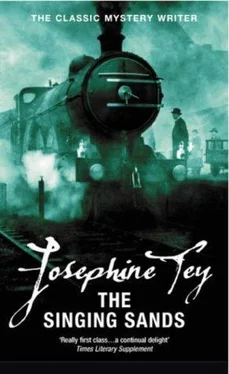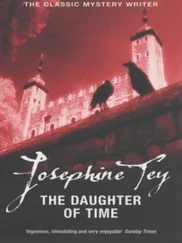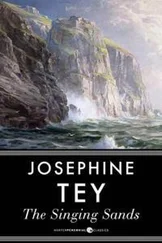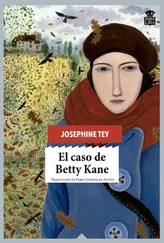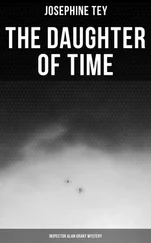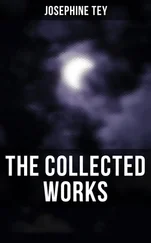Josephine Tey - The Singing Sands
Здесь есть возможность читать онлайн «Josephine Tey - The Singing Sands» весь текст электронной книги совершенно бесплатно (целиком полную версию без сокращений). В некоторых случаях можно слушать аудио, скачать через торрент в формате fb2 и присутствует краткое содержание. Год выпуска: 1952, Жанр: Классический детектив, на английском языке. Описание произведения, (предисловие) а так же отзывы посетителей доступны на портале библиотеки ЛибКат.
- Название:The Singing Sands
- Автор:
- Жанр:
- Год:1952
- ISBN:нет данных
- Рейтинг книги:5 / 5. Голосов: 1
-
Избранное:Добавить в избранное
- Отзывы:
-
Ваша оценка:
- 100
- 1
- 2
- 3
- 4
- 5
The Singing Sands: краткое содержание, описание и аннотация
Предлагаем к чтению аннотацию, описание, краткое содержание или предисловие (зависит от того, что написал сам автор книги «The Singing Sands»). Если вы не нашли необходимую информацию о книге — напишите в комментариях, мы постараемся отыскать её.
The Singing Sands — читать онлайн бесплатно полную книгу (весь текст) целиком
Ниже представлен текст книги, разбитый по страницам. Система сохранения места последней прочитанной страницы, позволяет с удобством читать онлайн бесплатно книгу «The Singing Sands», без необходимости каждый раз заново искать на чём Вы остановились. Поставьте закладку, и сможете в любой момент перейти на страницу, на которой закончили чтение.
Интервал:
Закладка:
He was happy up there, however; watching the changing patterns on the sea floor, violet and grey and green; watching the sea birds soar to inspect him and the flutter of nesting plovers on the low ground. Thinking about Mr MacKay’s mirages and the stones that walked. Thinking, as he never ceased for any length of time to think, about B Seven. Here was B Seven’s world, according to specification. The singing sands, the talking beasts, the walking stones, the streams that ceased to run. What had B Seven intended to do here? Just to come, as he himself had done, and look?
A flying dash, with an overnight case. That surely portended one of two things: a meeting, or an inspection. Since no one had yet missed him, then it could not have been a rendezvous. Therefore it was an inspection. One could go to inspect many things: a house; a prospect; a painting. But if one was driven to write verse en route then the verse was surely a pointer to the subject for inspection.
What had held B Seven in bondage to this bleak world? Had he been reading too many books by H. G. F. Pynche-Maxwell and his like? Had he forgotten that the silver sands and the wild flowers and the sapphire seas were strictly seasonal?
From the top of the hill at Cladda, Grant sent B Seven a salute and a blessing. But for B Seven he would not be sitting above this sodden world feeling like a king. New-born and self-owning. He was something more than B Seven’s champion now: he was his debtor. His servant.
As he left the shelter he had found for himself the wind caught him in the chest, and he leaned on it as he went downhill as he used to when he was a boy, so that it supported him and he could almost fall downhill in the most surprising manner and still be safe.
‘How long do gales usually last in this part of the world?’ he asked his host as they staggered through the darkness after supper towards the ceilidh .
‘Three days is the minimum,’ Mr Todd said, ‘but that doesn’t happen often. Last winter it blew for a month on end. You got so used to the roar of it that if it died away for a moment you thought you’d gone deaf. You’d be better to fly back, when you go, than cross the Minch in this weather. Most people fly nowadays, even the old people who’ve never seen a train. They take aeroplanes for granted.’
It occurred to Grant that he might indeed fly back. That if he waited another few days, if he had a little longer to grow accustomed to his new-found well-being, he might use the air journey as a test. It would be a pretty severe test; the severest he could subject himself to. To any claustrophobic the prospect of being boxed into a small space and hung helplessly in the air was sheer horror. If he faced it without wincing, and accomplished it without disaster, then he could pronounce himself cured. He would be a man again.
But he would wait a little; it was too early yet to ask himself the question.
The ceilidh had been in progress for some twenty minutes when they arrived, and they stood with the rest of the male population at the back. Only the women and the ancients occupied the chairs in the hall. Except for a row of male heads in the very front, where the Importances of the island sat (Duncan Tavish, the merchant, who was uncrowned king of Cladda, the two Churches, and some lesser lights), the male population lined the walls at the back and clustered round the entrance. It was an abnormally cosmopolitan gathering, Grant noticed, as the outsiders made way for them; both the Swedes and the Hollanders had come in force, and there were accents that belonged to the Aberdeenshire coast.
A girl was singing in a thin soprano. Her voice was sweet and true but without expression. It was like someone trying over an air on a flute. She was succeeded by a self-confident youngish man who received an ovation, on which he plumed himself so obviously that it was funny; one waited for him to bill his breast feathers like a bird. He was a great favourite, it seemed, with audiences of exiled Gaels on the mainland and spent more time being encored there than he did on his neglected croft. He sang a hearty ditty in a rough over-worked tenor and was cheered to the echo. It surprised Grant a little that he had never bothered to learn the rudiments of singing. He must, in his jaunts to the mainland, have met real singers, who had been taught how to use their voices; even in the case of someone so vain it was astonishing that he had not been moved to learn the basis of the art he professed.
Another woman sang another expressionless song, contralto, and a man recited a funny story. Except for the few phrases that he had learned from the old folk in Strathspey when he was a child, Grant understood no Gaelic, and listened as he would have listened to an entertainment in Italian or Tamil. Except for the delight of the people themselves in the thing, it was a sufficiently dull affair. The songs were musically negligible; some of them deplorable. If this was the kind of thing that people came to the Hebrides to ‘gather’, then they were hardly worth the gathering. The few inspired songs had, like all products of inspiration, gone over the world on their own wings. It was better that these feeble imitations should be left to die.
Throughout the concert there was a continuous coming and going among the men at the back of the hall, but Grant had been aware of it only as an obbligato, until his arm was pressed and a voice said in his ear: ‘Could you be doing with a wee drop yourself, perhaps?’ and he realised that Island hospitality was offering him a share of the scarcest commodity known to Island economy. Since it would have been ungracious to refuse, he thanked his benefactor and followed him out into the darkness. Against the lee wall of the meeting-place leaned a representative minority of the male population of Cladda in a contented silence. A flat two-gill bottle was thrust into his hands. ‘ Slainte! ’ he said, and took a swig of it. A hand, guided by an eye more acclimatised to the dark than his own, took the bottle back from him and a voice wished him health in return. Then he followed his unknown friend back to the lighted hall. Presently he saw Mr Todd being surreptitiously tapped on the arm, and Mr Todd too went out into the darkness to be sustained with something out of the bottle. It could happen nowhere else, Grant thought. Unless in the States during prohibition. Not much wonder that the Scots were silly and arch and coy about whisky. (Except of course in Strathspey, where the stuff was made. In Strathspey they put the bottle in the middle of the table, as matter-of-factly as an Englishman would, if a little more proudly.) Not much wonder that they behaved as if there was something very dashing, not to say, daring, about having a drink of whisky. The surprising, the knowing leer with which the ordinary Scot referred to his national drink could only come from inherited knowledge of prohibition: either the Kirk’s or the Law’s.
Warmed by his mouthful out of the flat bottle, he listened tolerantly to Duncan Tavish being confident and long-winded in Gaelic. He was introducing a guest who had come a long way to speak to them. A guest who needed no introduction from him or from anyone; whose own achievements spoke for themselves. (Nevertheless Duncan spoke for them at length.) Grant did not catch the Gaelic name of the guest, but he was aware that the renegades from outside came pressing in at the sound of the cheering that greeted Mr Tavish’s peroration. Either the speaker was the real interest of the evening or the whisky had given out.
He watched in idle curiosity the small figure detach itself from the front row, clamber up on to the platform with the aid of the piano, and stride into the middle of it.
It was Wee Archie.
Wee Archie looked even odder in Cladda than he had on Clune moor; his stature more inadequate, his cockatoo brightness more startling. The kilt was not the dress of the islands, and among all these sober-coloured males in their thick, stiff clothes he looked more than ever ‘a souvenir doll’. Without his dashing bonnet with its sprouting greenery he looked somehow undressed, like a policeman without his helmet. His hair was very scanty, and was drawn in thin strings across the top of his head to hide the bare patch. He was like something out of a not very expensive Christmas stocking.
Читать дальшеИнтервал:
Закладка:
Похожие книги на «The Singing Sands»
Представляем Вашему вниманию похожие книги на «The Singing Sands» списком для выбора. Мы отобрали схожую по названию и смыслу литературу в надежде предоставить читателям больше вариантов отыскать новые, интересные, ещё непрочитанные произведения.
Обсуждение, отзывы о книге «The Singing Sands» и просто собственные мнения читателей. Оставьте ваши комментарии, напишите, что Вы думаете о произведении, его смысле или главных героях. Укажите что конкретно понравилось, а что нет, и почему Вы так считаете.
